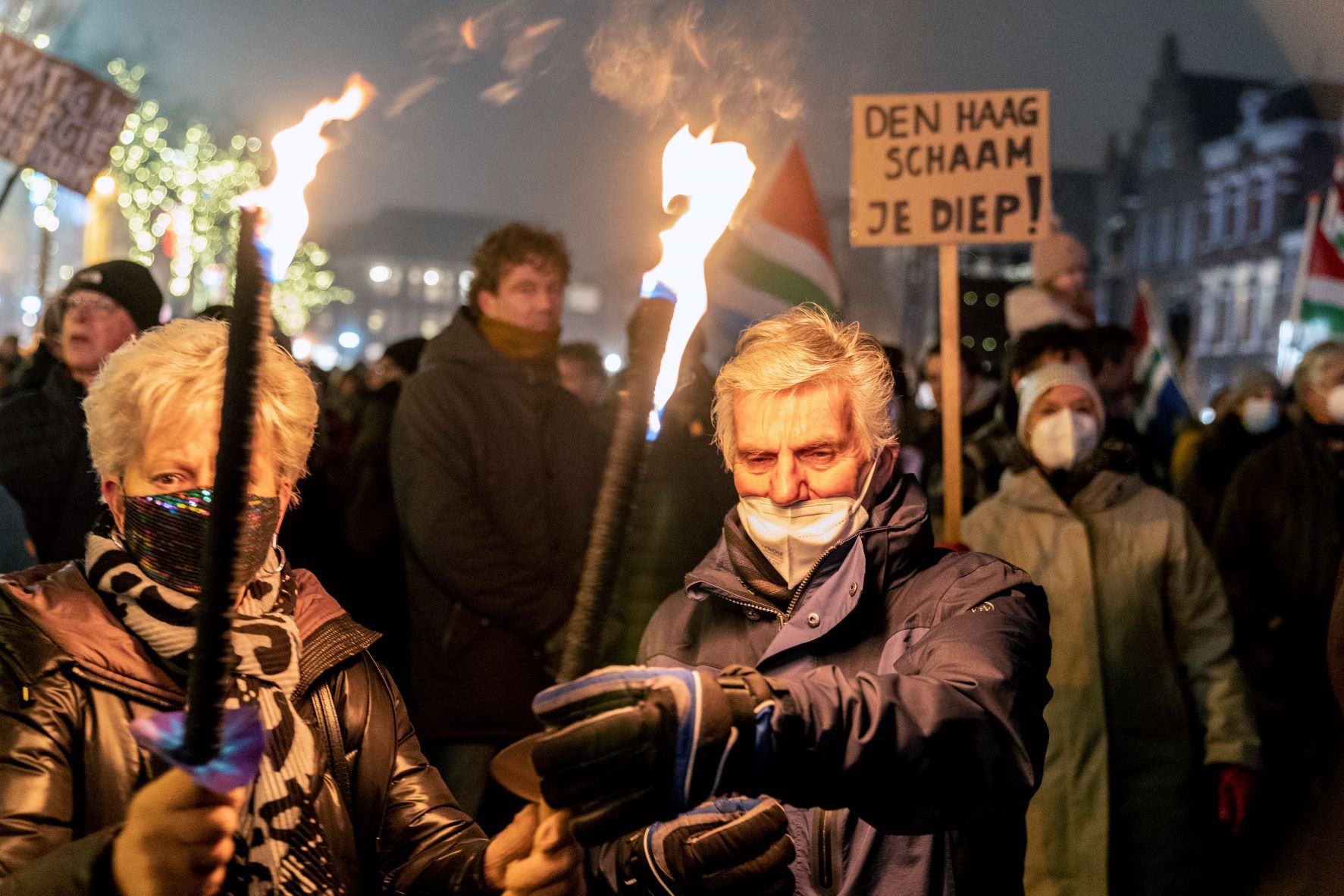There is no good time for bad news, but the announcement made by Minister Blok the day before his departure about extra gas production in Groningen was very unfortunate.
Last weekend (15 January 2022), some 10,000 people took part in a torchlight procession in Groningen as a protest against gas extraction and its consequences. (Photo: Reyer Boxem)
Delta spoke with energy economist and member of the Mining Council Dr Aad Correljé and Energy Systems Analyst Prof Kornelis Blok – no relative of the former Minister Stef Blok – on the phone, both of whom work at the Faculty of Technology, Policy and Management.
1. Why do we need more gas?
It depends on how you look at it, says Correljé. In the new gas year, from October 2021 to September 2022, an estimated 7.6 billion cubic metres will be produced. That is more than the previous estimate of 3.9 billion cubic metres, but less than the 7.8 billion cubic metres that were extracted last year. When planning the phase-out, in 2018 former minister Wiebes calculated that 13 billion cubic metres would still need to be extracted in 2022, and we are well below that now. In retrospect, last year’s estimate (3.9 billion cubic metres) was too optimistic, Correljé notes. If anything goes wrong, as is currently the case in Germany, then someone has to bring the bad news. That person was the former Minister Stef Blok who shared the bad news, not wanting to burden his successors at the Ministry of Economic Affairs and Climate Change with it, assumes Kornelis Blok.
2. What went wrong in Germany?
Correljé mentions two factors: the building insulation campaigns in Germany resulted in less savings on natural gas than expected, and the German gas fields cannot produce enough to meet the extra demand. So Germany is calling on the Netherlands for extra supplies in line with the long-term supply contract.
3. Can’t we get out of the contract?
Gas contracts can be renegotiated, says Correljé, but you cannot suspend them. Even during the coldest periods of the Cold War, Russia continued to deliver according to its contract. Just as they are doing now: exactly according to contract and nothing more. Besides, Blok says, it would not even solve the extra extraction in the Netherlands. According to the Minister’s letter – he takes a look at it – it concerns 1.1 billion cubic metres for export to Germany and 2.6 billion cubic metres to fill the national reserves in the empty gas fields of Grijpskerk and Norg with low-calorific gas. Since 2019, the Dutch state has held a strategic gas reserve, as it had done for oil. Small empty gas fields are used for storage. Before 2019, this was not necessary because the Netherlands was a producer of natural gas, and now it is a consumer. Once those fields are filled, from 2023 onwards, the Groningen field will no longer be needed as a national reserve.
4. Can’t we import the gas?
No, because customers in Germany, just like in the Netherlands, have equipment that is adjusted to low-calorific gas (energy content 32 megajoules per cubic metre). Imported gas (with 38 MJ/m3) has to be diluted with about 14% nitrogen to be used in the Dutch and neighbouring German gas network. The nitrogen plant, which can apply this process at a large scale (up to 10 billion cubic metres per year), has suffered construction delays due to Corona and will not be available until next summer. Import is therefore not an option at present as the gas cannot be used.
5. When can the Groningen gas tap finally be closed?
That decision awaits two things: that the nitrogen plant is operational so that the Netherlands can run entirely on imported gas; and, that the underground storage facilities are full. Then Groningen can ‘go on the pilot light’ as it is called. That could be in the course of 2022. In 2023, extraction will be definitively terminated, somewhat earlier than planned.
6. Really, honestly?
Never say never. Correljé assumes that the parties involved will stick to supply contracts as they always have done, even if a crisis were to occur in Ukraine and Europe were to come into conflict with gas supplier Russia. Blok says this scenario would “make him a bit nervous”. Even if the Russians keep their word, a pipeline in a war situation can easily be sabotaged or blown up, stopping the supply. In such a case, it cannot be ruled out that the Groningen tap will still be opened squeakily. But only in the event of an emergency.
Do you have a question or comment about this article?
j.w.wassink@tudelft.nl


Comments are closed.